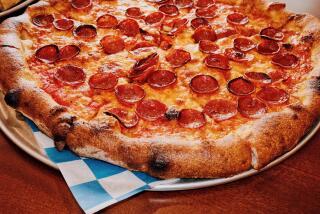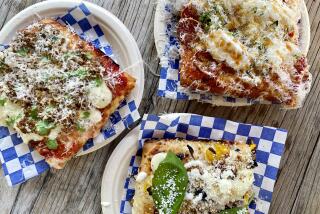Food trucks are rolling into the mainstream
Familiar restaurant names are starting to show up in the parade of brightly painted food trucks jostling for customers.
In Los Angeles, the venerable Canter’s Deli, a fixture on Fairfax Avenue since 1931, is now also serving potato pancakes and matzo-ball soup from a truck. The upscale Border Grill restaurants have two trucks, serving gourmet tamales in paper cups so they’re convenient for pedestrians to eat.
For dessert, there’s the Sprinkles Cupcakes chain, which added a truck to its 11 brick-and-mortar locations last year.
And the idea is spreading: Soon Southern Californians will be able to buy barbecued beef from a Sizzler U.S.A. truck, and Arizonans grab a foot-long from a Subway sandwich truck.
Fatburger franchisees have seven trucks on order, for use in the United States and overseas. Johnny Rockets has a truck in Washington, D.C., with plans for more around the country.
These mobile kitchens from established restaurants are nosing into line alongside vehicles run by streetwise-renegade chefs. They are offering food designed in corporate kitchens to compete with the wild and crazy offerings that have created buzz among foodies from coast to coast.
“Ten percent of the top 200 chains will have trucks on the road within the next 24 months,” predicted Aaron Noveshen, a restaurant industry consultant who co-owns the Pacific Catch restaurants in San Francisco and the online food-truck portal Mobi Munch. “They’re all talking about it.”
The idea of running a Sizzler truck grew after the chain’s chief executive, Kerry Kramp, saw people wait for nearly an hour to get food from vendors parked along Abbot Kinney Boulevard in Venice.
“I became a food-truck-crazy maniac like everybody else because I couldn’t figure out what in the world was making people stand in line for 45 minutes,” he said. “I was thinking, ‘These people should be going to Sizzler.’”
Culver City-based Sizzler USA has ordered one truck to start and hopes to put more on the streets if it is successful. During the 10 weeks it will take to outfit the truck, Kramp said, the company will decide what types of food to offer. Some possibilities include fish and chips and tri-tip sandwiches.
Catering trucks have long been lunch and break-time fixtures at factories, office complexes and other locations that didn’t have restaurants nearby. The food was often not exactly gourmet quality; one common nickname for these trucks is the unflattering “roach coach.”
That image was turned on its head in late 2008, when chef Roy Choi hit L.A. streets with Kogi, offering high-end combinations of Korean, Mexican and other ethnic foods.
About 4,000 food trucks are licensed to do business in Los Angeles County. Roughly 115 are considered gourmet, run by ambitious young chefs who offer unusual foods and use the online service Twitter to let customers know where they will be parking on any given day.
The trend has gone national, with the Food Network recently launching a reality TV show in which seven teams of cooks drive catering trucks across the country in a race to make the best food and win over diners.
“It’s definitely here to stay,” said Mary Sue Milliken, chef and co-owner of Border Grill, Ciudad and other restaurants. Her company has two trucks in Los Angeles and is considering using one in Las Vegas.
Food trucks, she said, allow restaurateurs to bring food to people in congested areas or places that can’t support a full-on restaurant.
Last week the California Restaurant Assn. held a meeting in Sacramento for restaurant owners and food-truck operators. The goal was in part to settle some tensions between the two — restaurants see the trucks as siphoning off business. But another goal was to help restaurateurs get into the truck business.
Launching a truck is cheaper than setting up a restaurant, said Jot Condie, president of the restaurant association. So a company that wanted to expand into a new town could send a truck there first to see whether residents liked the food.
Arthur Djahani, whose family owns Armenco Catering Truck Manufacturing in Sun Valley, said nowadays he receives 50 to 100 inquiries a week, up from perhaps a dozen a week before the trend began two years ago. The company is building the truck for Sizzler and has fielded inquiries from representatives of Shakey’s Pizza, the Habit, Poquito Mas, Johnny Rockets and Koo Koo Roo, he said.
Elma Eaton, co-owner of California Cart Builder in Lake Elsinore, said her company has outfitted 70 custom trucks over the last 18 months, putting in stoves, ovens and cash registers.
The company is making seven for a Fatburger franchisee in Dubai, at a cost of $300,000 to $400,000 apiece, and is also working with a Subway franchisee in Arizona, she said.
Many of the free-wheeling chefs who run the independent trucks want to enter the mainstream. Josh Hiller, co-owner of the catering truck outfitter RoadStoves, said the next step for many of his clients is to open restaurants of their own and get stores to carry their food.
Gerald Lee, who owns a bright-yellow-and-red truck called the Place, which specializes in all things pastrami, hopes to open a restaurant of his own soon.
Like his truck, it would sell pastrami melts, pastrami-smothered hot dogs and other delicacies, he said. “We want to be a player in the pastrami world.”
sharon.bernstein@latimes.com
More to Read
Eat your way across L.A.
Get our weekly Tasting Notes newsletter for reviews, news and more.
You may occasionally receive promotional content from the Los Angeles Times.








